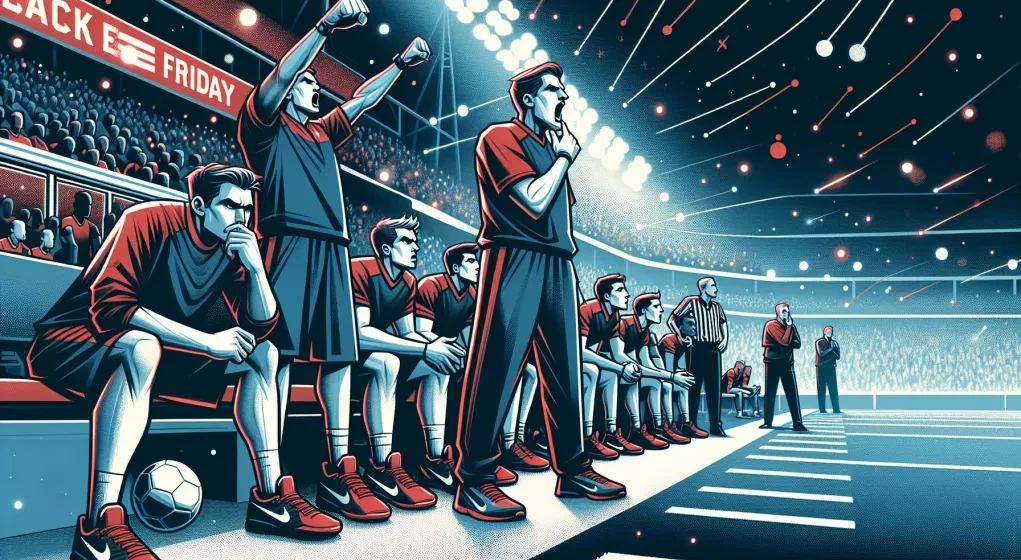As the autumn leaves scattered across the gridirons of America, the drama of the National Football League was playing out with a twist of fate for one particular young quarterback. In the crucible of a season defined by its fervency, the storied New York Jets were at the helm of a crucial decision. The team’s marquee player, Zach Wilson, once a herald of promise within the organization, found his tenure as the spearhead of the offense abruptly benched.
Tim Boyle—whose resume as a backup was more stalwart than stellar—had been tapped to step into the limelight as the starting quarterback for the imminent clash against the Miami Dolphins. This momentous game was to be no ordinary fixture; it was the NFL’s inaugural Black Friday encounter, where the splendor of Thanksgiving festivities would give way to the clash of helmets and the pursuit of victory on the following day.
Wilson, whose storied ascent began unexpectedly in the shadows of the revered Aaron Rodgers, had burst onto the scene with fervor when the latter’s season was cut short by a devastating injury. Trusting fate and Wilson’s arm, the Jets forsook the allure of free agents and trades, and instead, anchored their hopes within him.
Hope flared brightly as Wilson gallantly led the Jets to an awe-inspiring victory over the undefeated Philadelphia Eagles in Week 6; however, that luster would soon dim. The following four games saw the Jets beholden to a trifecta of losses garnished by a paltry sum of 24 points—an offensive drought that culminated in a humbling defeat at the hands of the Buffalo Bills.
Amid the whispers of fans yearning for alternative talents like Josh Dobbs, the Jets’ offense languished, its pulse barely felt against the backdrop of the league’s lowest outputs. Wilson, besieged by defense after defense, had been sacked an astonishing 38 times. Each interception, a total of seven, was a sting; each pass completion rate—a glum 59.2%—a heavy anchor to the team’s aspirations.
As the Jets’ scorekeeper seldom troubled the numbers, Wilson’s fortune was cast. Head coach Robert Saleh, faced with a quandary that tested his resolve, opted for Boyle’s arm in the hope of resurrecting the Jets’ offensive spirit.
Boyle, though scarce in triumphs as a starter, bore an air of certitude that belied his experiences. His erstwhile relief appearance against the Bills highlighted a decisiveness and rapid dispatch of the ball that the sputtering Jets’ offense desperately needed. His intention was clear: rejuvenate the offense, provide a spark, and uphold the tenacity of the Jets’ venerated defense.
Meanwhile, the NFL’s wheel of fortune continued unabated. The Dolphins, with their sights set on solidifying their playoff berth, faced the Jets—a team whose odds of postseason action were fading to the whims of fate. The Jets’ journey under Boyle’s stewardship commenced with a solitary aim: to reclaim the essence of a team with a storied past and a hunger for victory.
As the thrum of Black Friday’s showdown approached, fans and enthusiasts alike pondered the fate of Gang Green. The sportsbooks reflected the uncertainty and optimism that circulates within the heart of every underdog story. Yet within the realm of predictions and probabilities, one truth remained—the game would be contested not on paper, but on the vast expanse of the field, where every pass, every tackle, and every moment of brilliance could tilt fate’s scale in favor of the bold.
And so, as Thanksgiving gave way to the fervor of Friday’s battle, the Jets stood poised at the edge of destiny. With a new commander under center, and the undying spirit of the gridiron at their back, they charged forward into the fray, not just in pursuit of victory, but in the perennial quest for glory that is the essence of the game.






